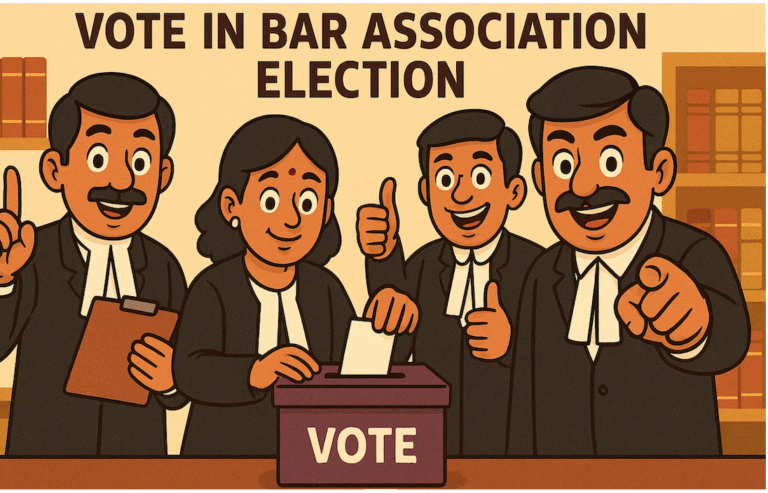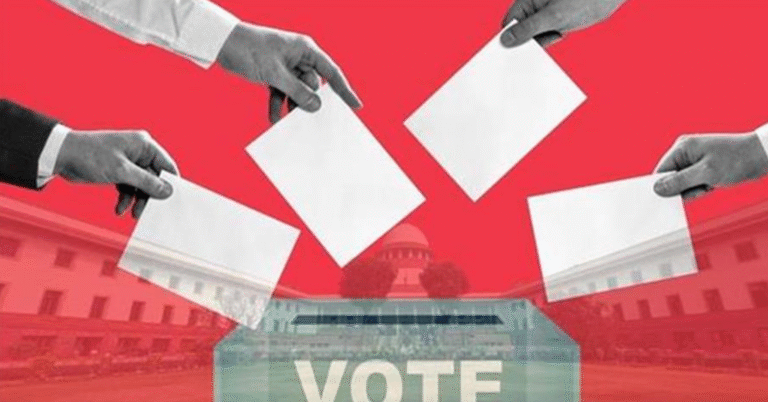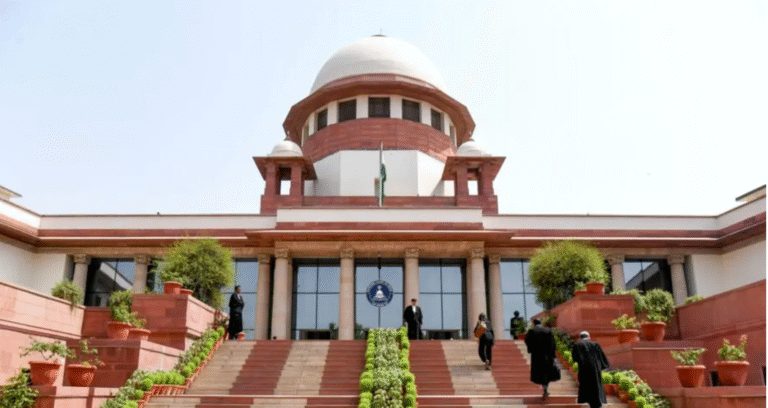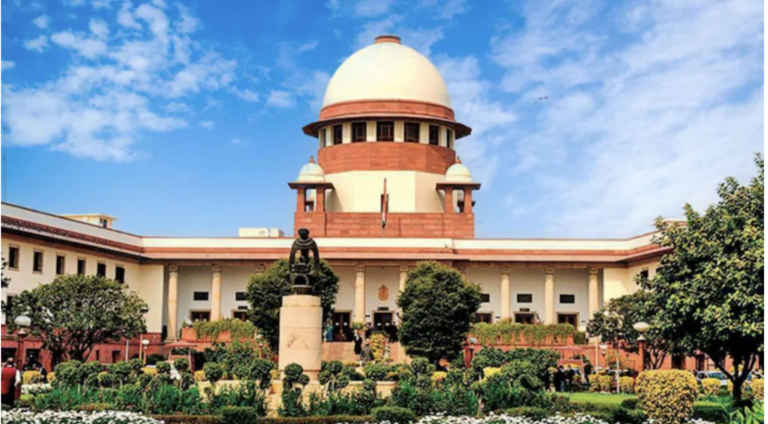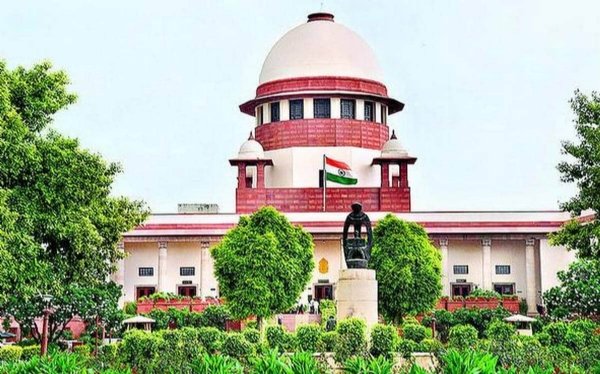Fifteen Advocates, including Women Lawyers from SC/ST and Backward Communities, File Writ Petition Seeking ₹50 Lakh Compensation Each Against State of Maharashtra for Violation of Fundamental Rights by Chief Justice Chandrashekhar-led Bench
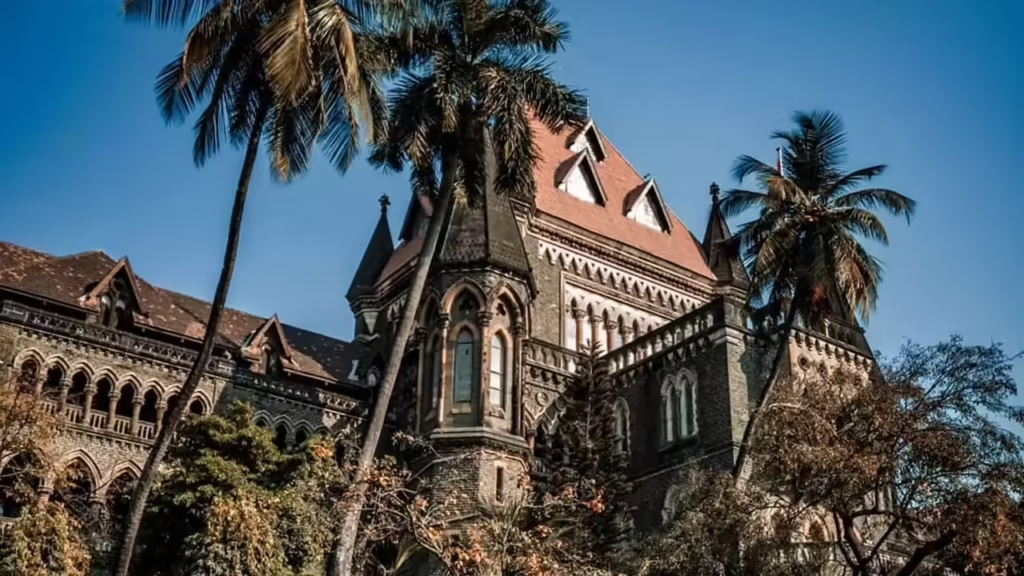
For similar mistakes committed by Justice Z. A. Haq, the Division bench headed by Hon’ble Chief Justice of India, Shri Bhushan Gavai, had quashed the contempt proceedings and expressed regret to 16 advocates, where a Judge of the Bombay High Court had passed an order in a contempt matter without following due process. in the case of Suo Motu (Court on its Own Motion) v. T.G. Babul, 2018 SCC OnLine Bom 4853.
Nearly 1,500 advocates have already shown willingness to represent the Petitioners and have submitted vakalatnamas to the office of Indian bar Association. The case is being treated as a matter of crucial importance to the independence of the Bar.
Earlier, in Ramesh Maharaj v. Attorney General of Trinidad & Tobago, (1978) 2 WLR 902, Bharat Devdan Salvi v. State of Maharashtra, 2016 SCC OnLine Bom 42, and Walmik Bobde v. State of Maharashtra, 2001 ALL MR (Cri) 1731, the Courts categorically held that where the rights of advocates and citizen were violated by judicial orders, including wrongful conviction for contempt without framing charge and following procedure, the State was liable to compensate them. In both cases, the victim advocates were granted compensation in writ proceedings, recognising that the judiciary is an integral arm of the State and cannot be immune from liability for breach of fundamental rights of any citizen.
The advocates who are in process of filing the petition are Mr Vijay Kurle, Mr Ishwarlal Agarwal, Mr Partho Sarkar, Mr Abhishek N. Mishra, Ms Anushka Sonawane, Mr Devkrishna Bhambri, Mr Shivam Gupta, Mr Vikas Pawar, Ms Nicky Pokar, Ms Meena Thakur, Ms Priyanka Sharma, Ms Sonal Manchekar, Mr Sagar Ugle, Ms Nikita Kinjara and Mr Jayendra Manchekar.
The Petitioner-Advocates and the Bar Associations submit that, as per the law laid down by the Constitution Bench of the Hon’ble Supreme Court — Subramanian Swamy v. Arun Shourie, (2014) 12 SCC 344 and Indirect Tax Practitioners’ Assn. v. R.K. Jain, (2010) 8 SCC 281 — the actions undertaken by the Advocates in the present case were nothing but the discharge of their Constitutional Duty and they cannot be silenced by using contempt jurisdiction.
The Hon’ble Supreme Court has categorically declared the law that exposing judicial corruption and demanding action against the offences committed by Judges is the duty of every citizen and every Advocate under Article 51-A of the Constitution of India.
Furthermore, under the Rules of the Bar Council of India, it is the moral as well as statutory obligation of every Advocate to raise their voice against corruption, misconduct, criminal offences or serious misdemeanors committed by Judges within the judicial system, and to bring such matters into the public domain.
Therefore, the disclosures and statements made by the Advocates squarely fall within the ambit of their constitutional and moral duties; consequently, they cannot be treated as contempt of court.
Mumbai/ Delhi:- In a significant and welcome move, fifteen advocates — including women lawyers belonging to the Scheduled Castes, Scheduled Tribes, and Backward Communities — have filed a Writ Petition before the Bombay High Court, seeking interim compensation of ₹50 lakhs each from the State of Maharashtra. The Petitioners contend that their fundamental rights have been grossly violated by the actions of a Five-Judge Bench led by Chief Justice Chandrashekhar, and that the State is duty-bound to compensate them for the irreparable harm caused.
The prayers in the Writ Petition are ;
(a) To hold that, the declaration of “guilt” and the recording of adverse, disparaging, or stigmatic remarks against the Petitioner in the order dated 17.09.2025 is violative of Art. 14, 20 and 21 of is in direct contravention of the binding law laid down by the Hon’ble Supreme Court in Dushyant Mainali v. Diwan Singh Bora, 2024 SCC OnLine SC 5178; Neeraj Garg v. Sarita Rani, (2021) 9 SCC 92; and other binding precedents, wherein it has been categorically ruled that no adverse, condemnatory, or career-stigmatizing remarks affecting the reputation, dignity, or professional standing of an advocate may be made or recorded without first issuing due notice and affording him an effective opportunity to be heard and to place his defence on record.
(b) Hold and declare that the ex parte finding of “guilty under criminal contempt” against the Petitioner without trial, notice and opportunity is in gross violation of his rights under Article 14, 20 & 21 of the Constitution as it is against the settled principles of criminal jurisprudence and the mandatory statutory procedure under the Contempt of Courts Act, 1971 and the applicable High Court (Contempt of Courts) Rules, 1994 as per law laid down in R.S. Sehrawat v. Rajeev Malhotra, (2018) 10 SCC 574; L.P. Misra (Dr) v. State of U.P., (1998) 7 SCC 379; Mehmood Pracha v. Central Administrative Tribunal, 2022 SCC OnLine SC 1029; Khushi Ram v. Sheo Vati, (1953) 1 SCC 726; Pallav Sheth v. Custodian, (2001) 7 SCC 549; R.S. Sujatha v. State of Karnataka, (2011) 5 SCC 689; P. Mohanraj v. Shah Brothers Ispat Pvt. Ltd., (2021) 6 SCC 258; Bloom v. State of Illinois, 1968 SCC OnLine US SC 93; and S. Tirupathi Rao v. M. Lingamaiah, 2024 SCC OnLine SC 1764, Suo Motu Vs. Yeshwant Shenoy 2024 SCC On Line Ker 6231, wherein the Hon’ble Supreme Court has categorically held that an alleged contemnor is entitled to all safeguards available to an accused in a criminal case, and to the full protection of a fair criminal trial, including the presumption of innocence, the benefit of doubt, and the indispensable right to be heard and he should not be declared guilty without following the procedures laid down under Contempt of Courts Act, 1971 & Bombay High Court (Contempt of Courts Rules, 1994.
(c) Hold and declare that the declaration of “professional misconduct” and punishment of reprimand-warning which is the punishment provided under sec 35 of the Advocates Act, 1961, against the Petitioner is ex facie without jurisdiction, being in direct violation of the binding guidelines laid down by the Constitution Bench in Supreme Court Bar Association v. Union of India, (1998) 4 SCC 409, and contrary to the law declared in An Advocate v. Bar Council of India, 1989 Supp (2) SCC 25, in Gostho Behari Das v. Dipak Kumar Sanyal, (2023) 20 SCC 158.
Hold and declare that the order dated 17.09.2025 is ex facie violative of the guarantee of equality before law under Article 14, 20 and 21 of the Constitution of India, the mandate of Article 14 of the ICCPR, and the binding ratio of several Constitution Bench judgments of the Hon’ble Supreme Court. In the said order, Adv. Nilesh Ojha, though held prima facie guilty of contempt, was extended the benefit of natural justice by issuance of a show-cause notice before framing of charge under the Contempt of Courts Act, 1971, and was permitted to seek discharge by filing a reply affidavit, producing evidence, and availing other statutory safeguards available under law and rules. In stark contrast, the Petitioner and 15 other Advocates, who were in the very same order declared equally guilty for allegedly helping Adv. Nilesh Ojha, were not afforded any such opportunity, and without hearing them were summarily declared guilty and punished with a warning/reprimand. The rule of equality was thus disregarded, and those who were similarly placed and declared equals were treated unequally. Such discriminatory treatment constitutes a grave violation of the principles of natural justice, fairness, and equal protection of law, which the Hon’ble Supreme Court has consistently mandated in contempt proceedings, as summarized in Nanha v. State of U.P., 1992 SCC OnLine All 871, and reaffirmed in Javed Shaukat Ali Qureshi v. State of Gujarat, 2023 SCC OnLine SC 1155, where Hon’ble Supreme Court held that relief granted to one accused should be extended to all others standing on the same footing and not applying such parity would result in discrimination, breach of fundamental rights, and manifest injustice. Denial of the same relief to similarly placed co-accused amounts to a direct violation of the fundamental right to life and personal liberty guaranteed under Article 21 of the Constitution. It has been ruled that the High Court, while performing sovereign functions, cannot discriminate between persons similarly situated, as contrary decisions on identical facts would not only disappoint and dismay litigants but also erode the faith of the public in the judicial system.
(d) To hold and declare that the violation of Articles 14 and 21 of the Constitution in the present case is of the gravest nature, for the very reason that binding precedents more particularly the judgments in Gostho Behari Das v. Dipak Kumar Sanyal, (2023) 20 SCC 158; Dr. L.P. Misra v. State of U.P., (1998) 7 SCC 379; and R.S. Sujatha v. State of Karnataka, (2011) 5 SCC 689, S. Tirupathi Rao v. M. Lingamaiah, 2024 SCC OnLine SC 1764, were already placed on record in the pleadings as well as in the case law compilation, yet were ignored while passing the impugned order. It is further significant that Hon’ble Chief Justice Shri Chandrashekhar, who authored the impugned order, himself had earlier authored the reported judgment in Court on its Own Motion v. Rajiv Ranjan, 2024 SCC OnLine Jhar, 1224, wherein it was categorically held that no person can be proceeded against for contempt without following the mandatory provisions of the Contempt of Courts Act, 1971, the applicable High Court Rules, and the principles of natural justice. In view of such conscious departure from binding law and self-authored precedent, the violation of the Petitioner-Advocate’s constitutional rights is aggravated to the highest degree, thereby entitling the Petitioner to the grant of maximum interim compensation.
(e) Hold and declare that the fundamental rights of the Petitioner–Advocate under Articles 14, 20, and 21 of the Constitution of India have been grossly violated by the order dated 17.09.2025, whereby the Petitioner was ex parte declared guilty of “contempt” and “professional misconduct” by the Hon’ble High Court, despite the undisputed position that:
(i) The Petitioner was not a party-respondent to the said proceedings;
(ii) No notice of contempt or misconduct was ever issued to him; and
(iii) No opportunity was granted to submit his explanation, defence, or evidence;
(iv) High Court is not having jurisdiction to pronounce guilt of professional misconduct and punishment including warning/reprimand etc.
(f) Further hold and declare that the constitutional rights of the Petitioner under Art. 14, 20, 21 of the Constitution of India and Articles 14 of the International Covenant on Civil and Political Rights (ICCPR) have been violated by the said order dated 17.09.2025, and that the Petitioner is entitled to compensation under the doctrine of constitutional tort and the principle of public law remedy, as laid down in Ramesh Lawrence Maharaj v. Attorney General of Trinidad and Tobago, (1978) 2 WLR 902; Luis Hens Serena v. Spain, 2008 SCC OnLine HRC 20; Walmik Bobde v. State of Maharashtra, 2001 ALL MR (Cri.) 1731; Bharat Devdan Salvi v. State of Maharashtra, 2016 SCC OnLine Bom 42; and S. Nambi Narayanan v. Siby Mathews, (2018) 10 SCC 804, wherein the Courts have consistently recognized the liability of the State to pay compensation where fundamental rights are infringed by judicial or executive acts.
(g) Direct the Respondent–State to forthwith pay an interim compensation of ₹50,00,000/- (Rupees Fifty Lakhs only) to the Petitioner–Advocate, as immediate relief, without prejudice to his right to seek higher and aggravated damages and pursue appropriate remedies in other jurisdictions, in view of the gross illegality, blatant contempt of binding precedents of Hon’ble Supreme Court, and the irreparable injury inflicted upon his reputation, professional standing, and livelihood by the adverse remarks and the unlawful ex parte declaration of guilt.”
The Petition alleges gross and blatant violation of constitutional rights by a Five-Judge Bench headed by Chief Justice Chandrashekhar, which, in a suo motu contempt case:
· Passed adverse strictures against the advocates,
· Declared them guilty of contempt of court and professional misconduct,
· Did so without issuing notice, without impleading them as parties, and without granting any opportunity of hearing,
· Discriminated between identically placed advocates — giving Adv. Nilesh Ojha an opportunity to file a reply before framing of charges, but denying the same safeguard to the other 15 advocates, who were summarily punished with a warning.
Declaration of Guilt under contempt Without Due Process is Prohibited
t is the settled position of law that any person against whom the extraordinary jurisdiction of contempt is sought to be exercised is entitled to all the constitutional and procedural protections guaranteed to an accused in criminal jurisprudence. The Hon’ble Supreme Court has consistently held that contempt proceedings, though sui generis in nature, are quasi-criminal and must therefore strictly conform to the principles of criminal law.
Accordingly, the alleged contemnor enjoys the presumption of innocence until proven guilty through a fair trial conducted in accordance with law. The Court cannot record a finding of guilt in contempt without scrupulously following the mandated procedure of due process, which necessarily includes:
1. Issuance of a clear and specific show-cause notice, setting out the precise allegations of contempt;
2. Framing of a definite charge, informing the contemnor of the exact nature of the offence alleged;
3. Grant of full opportunity to file a reply and defence to the charge;
4. Right to lead evidence, both oral and documentary, and to cross-examine witnesses if produced;
5. Conduct of a full and fair hearing, ensuring compliance with natural justice; and
6. Application of the principle of proof beyond reasonable doubt, as applicable in criminal proceedings.
Any deviation from these safeguards vitiates the proceedings, since the right to liberty under Article 21 of the Constitution cannot be curtailed without adherence to procedure established by law.
This principle has been repeatedly emphasised by the Hon’ble Supreme Court in:
· L.P. Misra v. State of U.P., (1998) 7 SCC 379
· R.S. Sehrawat v. Rajeev Malhotra, (2018) 10 SCC 574
· P. Mohanraj v. Shah Brothers Ispat Pvt. Ltd., (2021) 6 SCC 258
· Mehmood Pracha v. Central Administrative Tribunal, 2022 SCC OnLine SC 1029;
· Khushi Ram v. Sheo Vati, (1953) 1 SCC 726;
· S. Tirupathi Rao v. M. Lingamaiah, 2024 SCC OnLine SC 1764,
· R.S. Sujatha v. State of Karnataka, (2011) 5 SCC 689;
High Court Has No Jurisdiction Over Professional Misconduct :-
The Petition further stresses that the High Court has no jurisdiction to record findings of “professional misconduct” against advocates or to impose punishments such as reprimand or warning. That jurisdiction is vested exclusively in the Disciplinary Committees of Bar Councils, which are mandated to follow procedures akin to a criminal trial.
This principle has been conclusively settled in authoritative judgments, including:
· Supreme Court Bar Association v. Union of India, (1998) 4 SCC 409
· Gostho Behari Das v. Dipak Kumar Sanyal, (2023) 20 SCC 158
· An Advocate v. Bar Council of India, 1989 Supp (2) SCC 25
Thus, the Petition asserts that the order dated 17.09.2025, by which fifteen advocates were declared guilty of contempt and professional misconduct without notice, charge, or hearing, is ex facie unconstitutional, without jurisdiction, and liable to be struck down with exemplary compensation
Strong Bar Backing
The Indian Bar Association has revealed that nearly 1,500 advocates have already submitted their vakalatnamas, expressing willingness to represent the Petitioners. The case is being treated as a matter of crucial importance to the independence of the Bar and the protection of advocates against arbitrary judicial action.
Adding weight to the Petitioners’ stand, it has been pointed out that Chief Justice of India Bhushan Gavai had earlier expressed regret to 16 advocates for a similar mistake committed by a Bombay High Court Judge in Suo Motu (Court on its Own Motion) v. T.G. Babul, 2018 SCC OnLine Bom 4853.
The Petitioners contend that the actions of the High Court Bench have struck at the very foundation of equality, due process, and fairness — values that lie at the heart of the Constitution of India and are specifically enshrined in Articles 14, 19, 20, and 21. By branding the Petitioners guilty of contempt and professional misconduct without issuing notice, framing charges, or affording an opportunity of hearing, the Bench not only infringed upon their fundamental rights but also set a dangerous precedent which, if left unchecked, would erode public faith in the judiciary.
The Petitioners assert that the award of compensation is not a matter of charity or discretion but a constitutional obligation of the State, flowing from the binding jurisprudence of the Supreme Court. Compensation in such cases serves a dual purpose: (i) it provides some measure of redress to the victims of judicial excess, and (ii) it restores public confidence in the justice delivery system by reaffirming that no authority, including the judiciary, is above constitutional discipline.
Further, in order to ensure accountability and prevent recurrence of such violations, certain advocates have also moved applications seeking sanction for civil and criminal prosecution of the erring judges . The provisions invoked include Sections 166, 167, 219, 220, 120-B, 34, and 107 of the Indian Penal Code (with corresponding provisions under the Bharatiya Nyaya Sanhita, 2023), which penalize public servants who:
· knowingly disobey the law (Sec. 166 IPC),
· frame incorrect or illegal records (Sec. 167 IPC),
· give unlawful judicial decisions (Sec. 219 IPC),
· confine or prosecute persons contrary to law (Sec. 220 IPC),
· act in criminal conspiracy (Sec. 120-B IPC), or
· abet unlawful acts (Secs. 34, 107 IPC).
Recognising that the doctrine of nemo judex in causa sua (no one should be a judge in his own cause) squarely applies, an application has also been made for the reconstitution of a Special Bench to hear this matter, so that justice may not only be done but may also be manifestly seen to be done.
The Petitioners further rely upon a consistent line of binding authorities which firmly establish that when fundamental rights are violated by judicial orders passed without adherence to due process, the State is constitutionally bound to compensate the victims.
In Sarvepalli Radhakrishnan University v. Union of India, (2019) 14 SCC 761, the Hon’ble Supreme Court granted ₹5 crores compensation to the aggrieved party. Similarly, in S. Nambi Narayanan v. Siby Mathews, (2018) 10 SCC 804, the Apex Court awarded ₹50 lakhs compensation in writ jurisdiction, holding that wrongful acts of State authorities resulting in deprivation of liberty or dignity warrant monetary redress as a constitutional obligation.
Closer home, in Bharat Devdan Salvi v. State of Maharashtra, 2016 SCC OnLine Bom 42 and in Walmik Bobde v. State of Maharashtra, 2001 ALL MR (Cri) 1731, the Bombay High Court also granted compensation in writ jurisdiction to the victim whose constitutional rights had been violated by a wrongful judicial order.
On the international plane, the Petitioners rely on the authoritative decision of the 17-Judge Bench of the United Nations Human Rights Committee, comprising, inter alia, Hon’ble Justice P.N. Bhagwati (former Chief Justice of India), in Anthony Michael Emmanuel Fernando v. Sri Lanka, 2005 SCC OnLine HRC 22.
The Committee strongly condemned the conviction and imprisonment imposed in contempt jurisdiction by the Chief Justice of Sri Lanka, declaring the same to be arbitrary, draconian, inappropriate, and violative of Article 9 of the ICCPR, and directed the State to pay compensation and to ensure appellate safeguards against such convictions.
These authorities, both domestic and international, reinforce the principle that compensation is not a matter of discretion but an enforceable constitutional remedy, whenever citizens suffer grave and irreparable harm due to judicial or executive excesses.
The Hon’ble Supreme Court has also clarified that compensation awarded in writ jurisdiction is only interim in nature, and that the aggrieved party is free to claim further damages by way of a civil suit, as well as by invoking Section 357 of the Code of Criminal Procedure for additional redress.
Equally well settled is the principle that compensation granted by the State must ultimately be recovered from the concerned public servant, including Judges, who are responsible for the violation of constitutional rights. This doctrine has been categorically laid down in:
1. Directions in the Matter of Demolition of Structures, In re, (2025) 5 SCC 1;
2. Lucknow Development Authority v. M.K. Gupta, AIR 1994 SC 787.
Accordingly, the Petitioners submit that their claim of ₹50 lakhs each as interim compensation is firmly supported by constitutional jurisprudence, statutory principles, and international human rights law, and that the State is bound not only to pay such compensation but also to recover the same from the erring judicial officers responsible for these violations.
In Lucknow Development Authority v. M.K. Gupta, AIR 1994 SC 787; it is ruled that;
“Commission should direct recovery of the same from persons responsible for that.- When the Court directs payment of damages or compensation against the State the ultimate sufferer is the common man. It is the tax payers’ money which is paid for inaction of those who are entrusted under the Act to discharge their duties in accordance with law. It is, therefore, necessary that the Commission when it is satisfied that a complainant is entitled to compensation for harassment or mental agony or oppression, which finding of course should be recorded carefully on material and convincing circumstances and not lightly, then it should further direct the department concerned to pay the amount to the complainant from the public fund immediately but to recover the same from those who are found responsible for such unpardonable behaviour by dividing it proportionately where there are more than one functionaries.”

